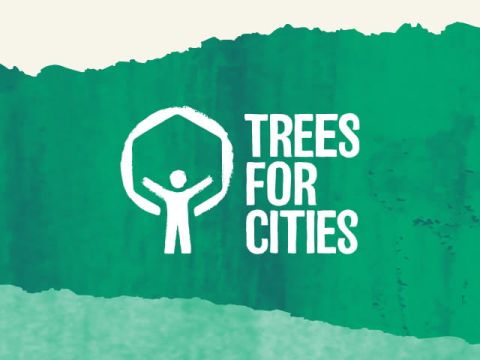How Learning Outside Improves Wellbeing
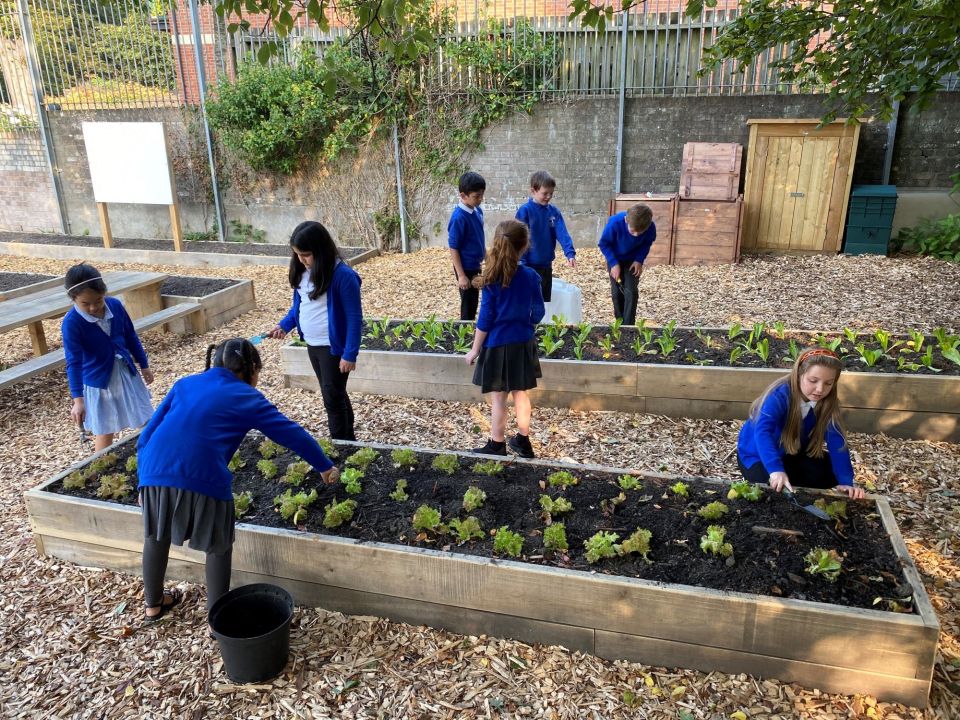
Do you have school playground memories? Did they involve climbing trees, rolling around in grass, maybe picking flowers?
If so - count yourself lucky! Many children's playground experiences involve tarmac and concrete, and a significant lack of green. With more and more research coming out about the important role that nature has in supporting our mental wellbeing, combined with the worrying stat that 1 in 6 children are already feeling the effects of poor mental health - it's about time we make greenery in playgrounds a necessity, rather than a nice to have.
Listening to children's voices
This week is Children's Mental Health Week, and the theme is ‘My Voice Matters’. Listening to the voices of pupils has been an integral part of our work in planning and building Edible Playgrounds in schools (one of our Trees for Schools initiatives). With access to green spaces, children are given the chance to learn about growing, greenery and eating healthy via our lively, interactive and multi-sensory gardens. Most importantly, pupils have the opportunity to learn outside in the fresh air and connect with nature.
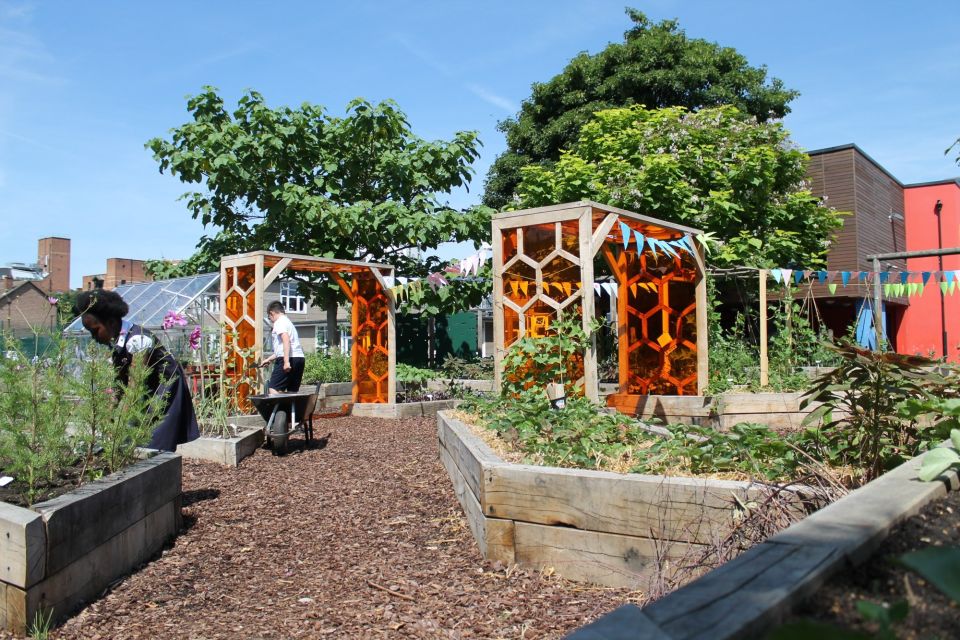
86%
of survey respondents to our Lead Teacher Survey said their Edible Playground had moderate to significant positive effect on pupils’ moods, self-esteem and mental health.
It’s said that a lack of playing, exploring and learning outdoors is increasingly resulting in a ‘Nature Deficit Disorder’, which is the idea that spending less time outside could lead to behavioural problems (Stephen Moss/National Trust 2012). However, learning in an outdoor environment has been shown to increase mental health by boosting mood, confidence and self-esteem. According to DEFRA, the benefits of outdoor play and learning contribute to happy, healthy childhoods.
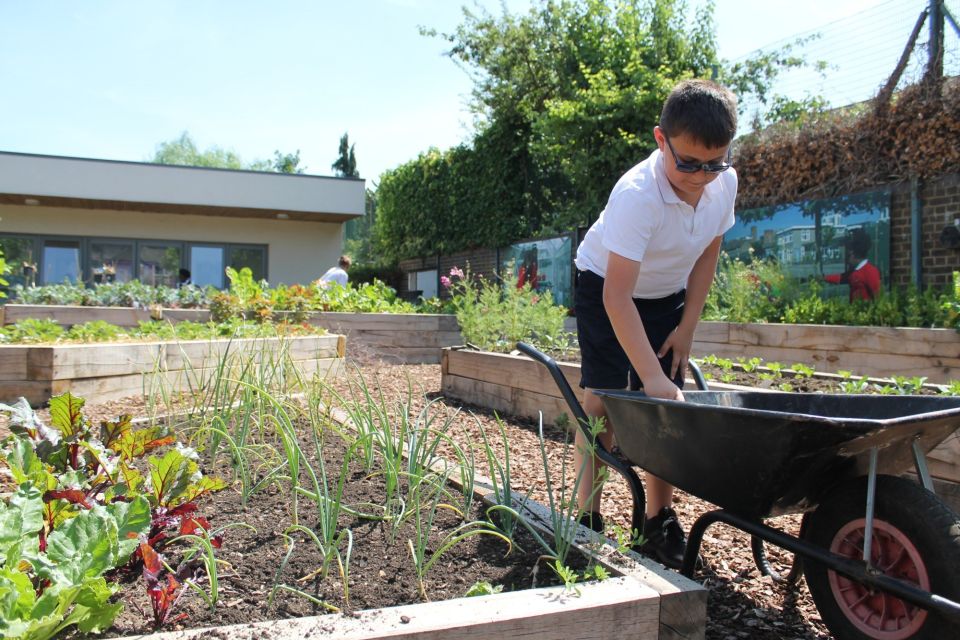
Since launching our first Edible Playground back in 2005, teachers have consistently told us how crucial the Edible Playgrounds have been towards increasing the wellbeing of the school in general. Tracey Langridge, Rockmount’s head teacher, told us:
“Once we noticed the impact it had on wellbeing, we enrolled on the Wellbeing Award for Schools programme and a big part of our application was food growing. It all came from the work we started with the Edible Playground as a whole school project on mental health. I believe it could not have happened without the garden as it’s so instrumental in getting everybody involved”.
Tracey Langridge, Rockmount’s head teacher
As part of our Lead Teacher Survey, we also heard outstanding feedback highlighting the support the gardens have given to both pupils and teachers, especially during the pandemic.
Snaresbrook Primary School in East London has had an Edible Playground since 2018 and teacher Lyndsey Clifton tells us the garden has been important for both children and staff’s wellbeing.
“Our Edible Playground has been an invaluable resource during the pandemic. During the first lockdown the Edible Playground was used by our key worker children on a daily basis for planting, growing, playing and a quiet calm space for reflection. When the whole school was allowed back after lockdown measures were eased the playground was a great resource for all children and staff, especially for those who did not have access to a garden or green space. The sense of being somewhere which was ‘alive’ with flowers and vegetables growing and a haven for minibeasts proved a wonderful resource for mental well-being.”
Lyndsey Clifton, teacher at Snaresbrook Primary School
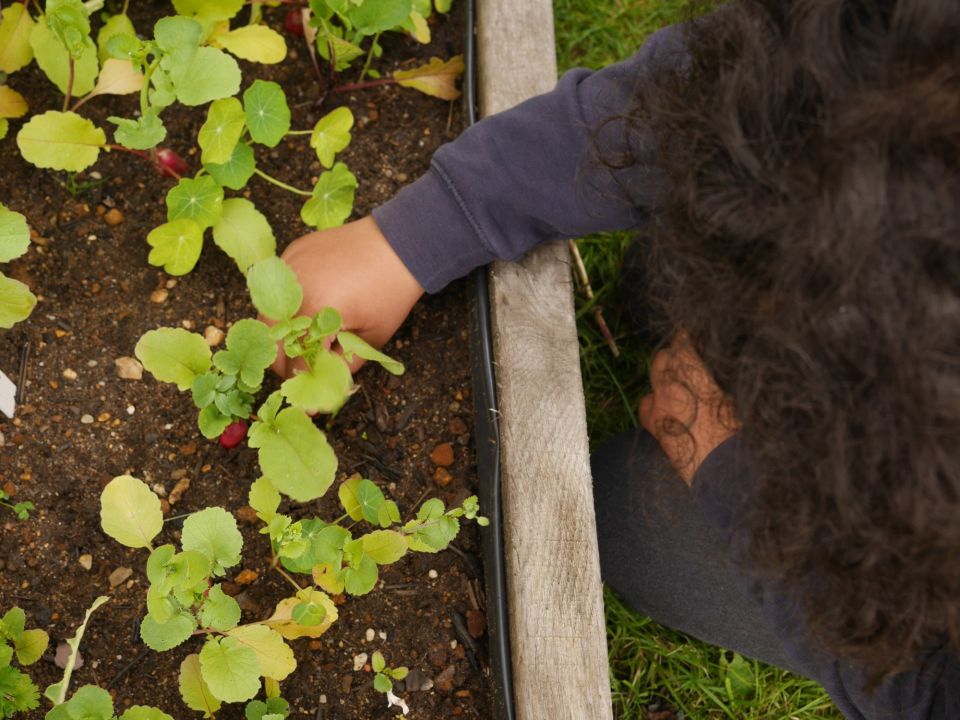
CONNECTING WITH NATURE
Learning outside in one of our Edible Playgrounds also offers the benefit of connecting with nature - for both children and adults. Regular access to nature through outdoor learning in schools enables children to develop their understanding and capacity to deal with the world around them (Malone and Waite 2016), and more and more studies are showing that spending time in green spaces helps people relax by reducing stress.
93%
of schools said the Edible Playground had a moderate to significant effect on pupils’ connection to nature.
More and more research is highlighting the restorative properties of spending time in nature is an excellent remedy for improving our mental health and wellbeing. The benefits of outdoor learning are also becoming widely publicised showing that allowing pupils out of the classroom and into a more natural setting boosts their development and health in a number of ways.
At Trees for Cities, we believe children should spend more time outdoors all year round. Through our Edible Playgrounds programme, we’ve seen first-hand how some fresh air and physical work can decrease levels of stress, increase focus and motivation and improve behaviour overall. As pressures on children increase and mental health challenges rise, it becomes more and more vital that we utilise these easy-to-achieve benefits.
Help us help schools nurture through nature
24,808 students in the UK engaged in our Trees for Schools programmes during 2022-23. This number is just the tip of the iceberg. We're looking to create more green space for as many children in the UK as possible - help us reach more young people by donating today.
Donate
Our work is made possible thanks to our partnerships with local councils, funders, the support from players of People’s Postcode Lottery and of course, our dedicated volunteers.
Donate to Trees for Cities and together we can help cities grow into greener, cleaner and healthier places for people to live and work worldwide.
Donate